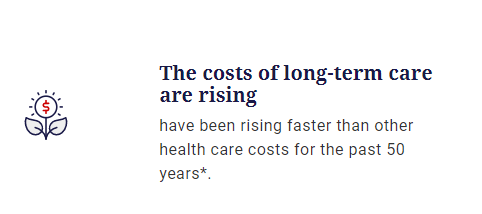What's missing from your financial plan?
What is long-term care?
Long-term care planning should be an essential part of any comprehensive financial plan, but most Americans nearing retirement haven’t given it the consideration it needs. Every day, roughly 10,000 Baby Boomers turn 65. Studies show that 70 percent of them will need some form of long-term care, but most of them haven’t provided for it when planning for their family’s future.1
Long-term care is a range of services and support you may need to meet your personal care needs. Medical care is part of that formula, but most of it is assistance with the basic tasks of everyday life, such as dressing, eating, taking medication, transportation and other things that are difficult for those facing chronic physical and cognitive impairments common in conditions such as Parkinson’s disease or dementia.

Benefits of a long-term care plan
Safeguard the well-being of your family
The benefits of having a plan that addresses long-term care are far-reaching for both you and your family. On the surface, making a decision to care for a loved one who needs long-term care may sound simple enough, but coordinating and managing care, researching and selecting agencies, services, caregivers and facilities, then ensuring that your loved one is getting the care they deserve can be a time-consuming, emotional, stressful and expensive process.
If your needs and desires are spelled out in your long-term care plan, you not only help to ensure you receive the level of care you desire, but you can also reduce the likelihood of family conflict over the specifics of your care. Furthermore, it can also reduce the physical and emotional toll on the person overseeing or providing your care, and may eliminate the need for that person to put their life, career or family on hold to care for you.
Protect your nest egg
The financial reasons for planning ahead for long-term care are also compelling. The costs of long-term care are rising and have been rising faster than other health care costs for the past 50 years2. The potentially devastating result is that long-term care can consume in a matter of months what took years to build. A solid plan can help enable you to continue to meet current responsibilities and preserve your assets so that they can provide for a surviving spouse, family members, charities or other obligations — simply put, so they can be used for what you intend them for, rather than to finance ongoing care. A plan that provides for the cost of care can also ensure that your family members don’t spend their own personal savings or retirement funds to pay for your care.

Estimating the costs of long-term care
Considering the cost of care is a critical step in developing your long-term care strategy. Every person is different, as are their needs.
What level of care is required?
Cost of care varies widely and the level of care required may change over time. Those who can continue living at home with only part-time assistance may be able to absorb the cost of care. If needs expand to require 24-hour care using multiple caregivers, a live-in, or a highly credentialed caretaker, the costs can begin to climb dramatically. In some cases, modifications to the home itself may be necessary and represent yet another cost.
For those who require the type of care provided by assisted living facilities, there are many options available. The average cost for an assisted living facility in Texas approaches $50,000 annually3, but high-end facilities catering to wealthier residents can range from $70,000 to over $130,000 per year, depending on the facility and the location.4
Plan for increasing costs over time
Finally, it’s also important to factor in the increasing costs of care over time. If assistance is required over a long period of time, for example 10 years or more, then the baseline expense plus the accretion of costs over time should be reflected in your plan.
Discussing your preferences with a knowledgeable advisor familiar with costs in your area and trends in long-term care can be an important step in adding long-term care to your financial plan.

Covering the costs of long-term care
Government programs
You may be curious about government benefits available through the Veteran’s Administration (VA), Medicare or Medicaid and whether they could cover or offset long-term care expenses for you. The VA
provides benefits for former servicemen and servicewomen along with their families. This includes home care and other extended care options; however, resources are limited, and individuals must meet both service and financial criteria. For nonveterans, Medicare and Medicaid are sometimes relied upon. Medicare may cover medical expenses, but generally does not cover nonmedical expenses. Patients
requiring this type of care will likely fund these costs themselves. Lastly, Medicaid provides for seniors in need, but only covers those who meet very low income and asset standards, and generally only covers care provided in a skilled nursing facility
Self-funding vs. long-term care insurance
Those who have significant assets may choose to self-fund the cost of long-term care. This can be a viable option; however, careful consideration must be given to accurately estimate costs in order to
solidify your current and future legacy. It is also important to note that even for high-net-worth and ultra-high-net-worth individuals, who may give less consideration to funding the cost of long-term care, understanding your care management options and identifying resources to help guide these decisions in advance can be the key to reducing stress and getting the best care. For those who cannot afford to self-fund, long-term care insurance can be an affordable way to offset the cost of care. It may also provide other benefits, like resources and assistance with researching, selecting and overseeing care.
Keep in mind that it doesn’t have to be a choice between the two extremes. You can create a plan that works for you combining both approaches. You may choose to offset some of the expense by purchasing a small insurance policy and funding any remaining costs should they arise.

Don't wait
Taking the time now to determine if there is a gap in your planning and closing it is the best way to limit financial or emotional consequences to the people who mean the most to you, should you require long-term care. Your Texas Capital Bank Private Wealth Advisors team has experience helping clients like you plan for whatever the future holds. When it comes to long-term care, there are many options available, and you and your advisor can work together to craft a plan that’s best for you.
You have a goal for your wealth, but a goal without a plan is just a wish. Don’t make a wish. Make a plan.
-
U.S. Department of Health and Human Services, July 1, 2015
-
Own your future, Texas Long-Term Care Partnership, http://ownyourfuturetexas.org/costs-to-consider/
-
Genworth 2016 Cost of Care Survey, conducted by CareScout®, April 2016, https://www.genworth.com/about-us/industry-expertise/cost-of-care.html
-
Phone survey of Texas-based senior care facilities, August 2017
*. Own your future, Texas Long-Term Care Partnership, http://ownyourfuturetexas.org/costs-to-consider/
**. Alzheimer’s Association, 2017 Alzheimer’s Disease Facts and Figures, https://www.alz.org/documents_custom/2017-facts-and-figures.pdf
Advisory services are offered through Texas Capital Bank Wealth Management Services, Inc. d/b/a Texas Capital Bank Private Wealth Advisors (“PWA”), a wholly owned subsidiary of Texas Capital Bank (“the Bank”) and an investment adviser registered with the U.S. Securities and Exchange Commission (“SEC”). SEC registration does not constitute an endorsement of the advisory firm by the SEC nor does it indicate that the advisory firm has attained a particular level of skill or ability. Brokerage services are offered through Kingswood Capital Partners, LLC (“Kingswood”), Member FINRA/SIPC. Texas Capital Bank Private Wealth Advisors and the Bank, are not registered broker/dealers and are independent of Kingswood. Investments and insurance products are not insured by Bank insurance, the FDIC or any other government agency; are not deposits or obligations of the Bank; are not guaranteed by the Bank; and are subject to risks, including the possible loss of principal. Nothing herein is intended to constitute an offer to sell or buy, or a solicitation of an offer to sell or buy securities.
Neither Texas Capital Bank Private Wealth Advisors; Texas Capital Bank, nor any of its employees provide tax or legal advice. Nothing contained in this communication (including any attachments) is intended as tax or legal advice for any recipient, nor should it be relied on as such. Taxpayers should seek advice based on the taxpayer’s particular circumstances from an independent tax advisor or legal counsel. The wealth strategy team at Texas Capital Bank Private Wealth Advisors can work with your attorney to facilitate the desired structure of your estate plan. The information contained in this communication is not a complete summary or statement of all available data necessary for making an investment decision, and does not constitute a recommendation. The information has been obtained from sources considered to be reliable, but we do not guarantee that the foregoing material is accurate or complete. Any opinions are those of the authors and not necessarily those of Texas Capital Bank Private Wealth Advisors or Texas Capital Bank.
©2020Texas Capital Bank Wealth Management Services, Inc., a wholly-owned subsidiary of Texas Capital Bank. All rights reserved. NASDAQ®: TCBI
Texas Capital Bank Private Wealth Advisors and the Texas Capital Bank Private Wealth Advisors logo are trademarks of Texas Capital Bancshares, Inc. and Texas Capital Bank.
www.texascapitalbank.com
Our Locations
To learn more about long-term care planning, contact Texas Capital Bank Private Wealth Advisors at [email protected] or 1.877.839.2770.